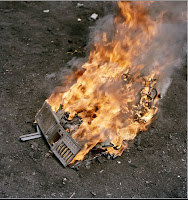Last February, The Boston Globe ran the story, followed by an editorial, describing this operation as an environmentally bad practice. These are the very same contract manufacturing factories where computer monitors were originally made... lending a Twilight Zone meaning for the "electronics take back coalition" (See To Serve Man)
 This week, New York Times photographer Pieter Hugo published photographs of a primitive African wire burning operation. Photos like the one at left have burned into our minds an image of developing nations so poor and backward that they cannot possibly manage used equipment. No one here is denying that primitive recycling markets also exist. In fact I first recommended that BAN focus on Africa and told them about the Lagos market. We want to raise the standards on "toxics along for the ride".
This week, New York Times photographer Pieter Hugo published photographs of a primitive African wire burning operation. Photos like the one at left have burned into our minds an image of developing nations so poor and backward that they cannot possibly manage used equipment. No one here is denying that primitive recycling markets also exist. In fact I first recommended that BAN focus on Africa and told them about the Lagos market. We want to raise the standards on "toxics along for the ride".But if BAN and NRDC are going to applaud the closure of the superb export factories in Indonesia, they should visit the people there who will lose their jobs, and the recycling operation set up for bad and unrepairable units. In the coming days I will post film interviews of the techs.
Does the NYTimes show a significant number of computers at the scrap yard? What is the percentage of bad to good? Were any of these in use for years before they were burned? Where is the data? Where is the science?
It's time for the NRDC, BAN, and ETBC to take responsibility for these "successes". They should visit the laid off workers and see the closed recycling line. As a former Peace Corps volunteer, I am deeply saddened by the loss of sustainable jobs for technicians who are looked up to like engineers in these developing nations.
Soundtrack for closing the Big Secret Factories in Indonesia? No brainer: Clubbed To Death by Australian composer Rob Dougan.
Dear BAN: I am begging you guys to stop these governments from bans on even tested CRTs. It is WAY beyond any reasonable interpretation of the Basel Convention. These places responded to our incentives, got ISO14001, set up glass-to-glass recycling for incidental breakage, and if we can replace what they were buying from shammers, we could have completely filled their orders from E-Stewards, R2, and SB20 suppliers who would have prepared the CRTs in a way we could have reached agreement on.
China made this kind of operation illegal, and the factories are still operating, but now it's completely out of reach of our efforts to incentivize them with fair trade incentives, ISO, etc. Viet Nam runs the CRTs overland to Kunming now.
We disagree pretty strongly on this issue. I'd like to remain cordial, as the CRTs will eventually go away, and LCDs may some day drop to the $20 levels needed by the fastest growing computer access segment (people earning $3000 per year buy more PCs now than developed nations). In the meantime, why can't BAN take a position AGAINST destruction of working units? If 70% are working, why accept a practice of shredding everything and leaving these markets to shammers?
These are manufacturer takeback programs. Is "Electronics Take Back" a cookbook?
These are manufacturer takeback programs. Is "Electronics Take Back" a cookbook?


No comments:
Post a Comment